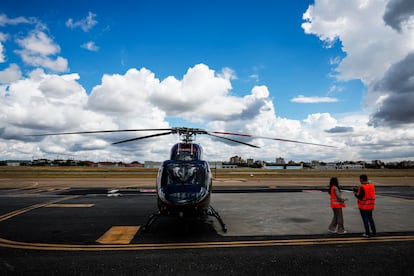Jewelry, jets and reggaeton: Riding the wave of the super-rich coming to Madrid
The luxury sector has been moving in on the capital, which ranks among the five most popular European cities for the super wealthy

The fact Madrid is on-trend is no longer news. In recent years, its name resonates in elite circles who are drawn to the new luxury hotels, its culture, security, business schools, and real estate. The latter is still cheaper than in other European cities, although a study published at the end of December by Knight Frank predicts that luxury real estate prices will grow in Madrid by 5% in 2025, surpassed only by Stockholm (6%) and on a par with Marbella. In another study, Knight Frank ranks Madrid as one of the five preferred European cities to move to among the super-rich of the 28 nationalities surveyed.
Unsurprisingly, businesses are emerging focused on those with bulging bank accounts who are arriving in droves from abroad and other parts of Spain.
This autumn, the burgeoning real estate market attracted one of the most prestigious global firms: Christie’s auction house. “We had to be there because the big firms are there,” says Olga García, general manager of Christie’s International Real Estate Madrid, who explains that the project began to take shape in 2020. “Madrid is still the great unknown. People are still surprised by how clean and safe it is and the quality of life we have,” she says. García adds that she was in London a week ago to promote the Madrid office and got “a great reception,” with many Europeans wanting help looking for a home in the city. At the Madrid headquarters, in the heart of the Salamanca district, they share space with the art and auction arm of Christie’s, something that only happens in Brussels and London. “It helps us to join forces and offer a comprehensive customer experience,” García says.
Not far from Christie’s office is Luna Jets, which has already completed its first year in the Spanish market. Carlos Matallana, director of the Spanish office, explains one reason that led this executive aircraft multinational to choose Madrid, along with Geneva, London, and Monaco: “The market has been served by small companies — there were no international brokers. It was not done in a comprehensive way. There could be more executive aviation than currently exists and we have seized the opportunity.” Another reason is simply that Madrid is a gateway to Latin America.

Matallana says that, in most cases, taking a private jet is rarely just a rich individual’s whim. “It’s really a time tool,” he says, and stresses that the market is driven by the executive client, the one who uses the jet to be able to go to several meetings in poorly connected places in the same day. He acknowledges that the influx of foreigners to Madrid is good for business, because many come from places where business aviation is more common. “In the end, you see your neighbor using this service. There is still a lot of room here for growth in personal travel.”
It is also more common in Latin America to use helicopters to move around large cities. “Some people are used to not traveling along the ground. This service is more normal elsewhere than in Spain,” says Fernando Gómez, spokesman for World Aviation Group, which has been awarded the air operator’s certificate for two helicopters offering private flights this year. “We did a business study and saw that there was sufficient demand for commercial flights. That’s why we decided to acquire a Bell 429, which is a star in the market,” says Gómez.
Unlike what happens in countries where air travel is more widespread, Madrid is hampered by regulations and flights are not made from a private home in the city to an office, for example. “The typology depends on the season. Now we are making many flights from Cuatro Vientos, where we have direct access to the hangar for greater privacy, to hunting or recreational estates, mainly in Extremadura, Castilla-La Mancha and Castile and León. In summer, we are more focused on the Málaga and Marbella region. Our clientele is both national and international, with an increasing number of Latin Americans. And we are seeing a growth in executive flights.”
Back in the upmarket Salamanca district, Joyería Cano, a Colombian jewelers with more than 100 years of history behind it, has opened. It actually had a store on the shopping street of Calle Serrano several years ago, and later in the department store El Corte Inglés. But now the firm has decided to go solo again and make the Madrid shop the first of 10 in Spain. “We saw the market is moving here right now, with a push from Latin America. It’s a wonderful niche for us. These are people with great purchasing potential and for whom this product is a great fit,” explains Eduardo Cano, the firm’s executive director.
Also from Colombia is Perro Negro, a nightclub that has just been established in the same neighborhood. It aims to be more than just another place to go dancing; it wants to be “a cultural movement, a global brand of reggaeton,” says co-founder Samuel Granados. The first club opened in Medellín seven years ago and, just over a year ago, one was opened in Miami. “We wanted to put Medellín on the world map through reggaeton. Then we opened in Miami because it is the epicenter of the [reggaeton] music industry. And then we wanted to migrate to Europe, and Madrid was the main gateway.”
Although Granados says Madrid’s Latino community is an important client base, the idea is to bring this type of music closer to Spaniards and Europeans. “It is one of the most fashionable genres in the world, but there is no disco where that is the only sound for six hours solid. We saw that there was a gap in the market.” Granados admits that the “experience” they want to offer the public is elitist due to the price. Reserving a VIP table, which seats 10 people, costs €1,500 ($1,565), which covers drinks. A “floor table” costs €300 for four and includes the entrance fee, which is €30, and a bottle. “We want to position reggaeton as something aspirational,” he explains.
These are just some of the businesses who are moving in to serve the rich in Madrid, a city whose popularity is taking off. According to the results of the latest Brand Finance Global City Index, a study of perceptions of cities worldwide, Madrid is the best Spanish city, rising five places to 17th out of cities in 20 countries, in the eyes of more than 15,000 people. Participants were questioned on various aspects. Regarding the best city in the world to visit, Madrid ranks fifth, and in lifestyle, seventh, while it ranks 23rd in terms of sustainability, thanks to the ease of public transport. However, it ranks just 55th in science and technology leadership, an area where there is still room for improvement in a city that is otherwise very much in demand.
Sign up for our weekly newsletter to get more English-language news coverage from EL PAÍS USA Edition
Tu suscripción se está usando en otro dispositivo
¿Quieres añadir otro usuario a tu suscripción?
Si continúas leyendo en este dispositivo, no se podrá leer en el otro.
FlechaTu suscripción se está usando en otro dispositivo y solo puedes acceder a EL PAÍS desde un dispositivo a la vez.
Si quieres compartir tu cuenta, cambia tu suscripción a la modalidad Premium, así podrás añadir otro usuario. Cada uno accederá con su propia cuenta de email, lo que os permitirá personalizar vuestra experiencia en EL PAÍS.
¿Tienes una suscripción de empresa? Accede aquí para contratar más cuentas.
En el caso de no saber quién está usando tu cuenta, te recomendamos cambiar tu contraseña aquí.
Si decides continuar compartiendo tu cuenta, este mensaje se mostrará en tu dispositivo y en el de la otra persona que está usando tu cuenta de forma indefinida, afectando a tu experiencia de lectura. Puedes consultar aquí los términos y condiciones de la suscripción digital.









































